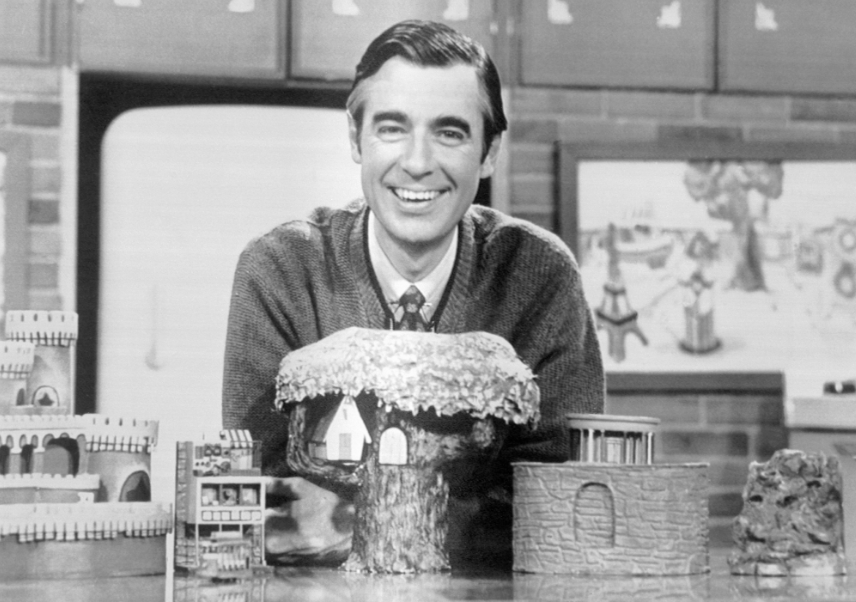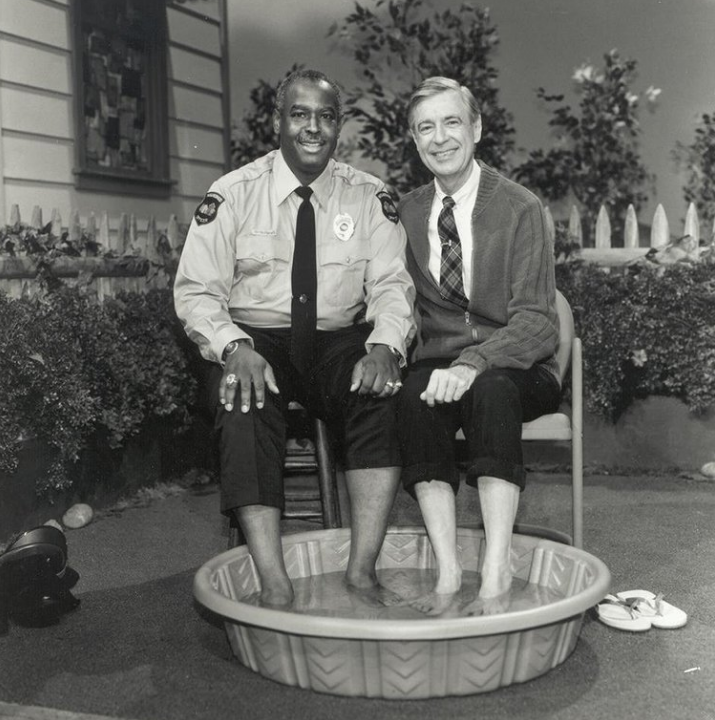
For Father’s Day I was watching the most heartfelt movies I’ve seen in a long time, “Won’t You Be My Neighbor.” It is a movie that will both lift you up with the possibilities of how much of an individual person can have a positive impact on masses of people as well as challenge you about what you’re doing to make the world a slightly better place. It is a movie that will have you laughing raucously and sniffling uncontrollably in joy and sorrow.
I simply can’t imagine any of you NOT watching this wonderful, self-affirming documentary movie about Fred Rogers and if you are able to I recommend you watch while it’s in a theater because the group reactions are cathartic. We clapped as Mr. Rogers testified before congress and used a personal narrative that won over the heart of the most hardened congressman and we laughed out loud at the on-set pranks by hippies to this “square” host and we sat in wonder as we watched footing of Mr. Rogers with Koko the gorilla.
The YouTube embed and this link have a short trailer.
If you don’t know “Mister Rogers Neighborhood” as a show I can tell you that it defined my generation’s childhood as nearly every Gen-Xer grew up on it. Some of my earliest memories of childhood are as a four-year-old sitting in front of the TV with Mr. Rogers talking directly to me. He showed empathy, he assumed I was smart, he talked to me about reading and then we would descend into “the world of make believe” where kings, queens and the scary Lady Elaine. I would race over to my parents or older brother, Ron, when Mr. Rogers put words up and I would shout, “What does that say? What does that SAY!?!”
What I didn’t realize were the broader social issues that Mr. Rogers was helping the nation deal with. In an era when there were national conflicts because segregationists were removing African Americans from swimming pools, Mr. Rogers invited his neighborhood police officer to cool off his feet with him.

Mr. Rogers dealt with assassination (as in Robert Kennedy’s) all the way through Space Shuttle disaster and even 9/11. He talked about anger, divorce, war and the like. Mr. Rogers’ philosophy that if children were hearing it in the home he had to give them the context of what was happening to the scared or angry grownups around them. He didn’t pretend children weren’t aware that adults were unhappy.
Fred Rogers was an ordained minister, an expert on childhood development and a lifelong Republican who fought for funding for public television to reach American children and help them develop alternative narratives to the emerging media onslaught around them. Mostly, Mr. Rogers was about preaching love and compassion and tolerance and all of the lessons he took from The Bible but delivered in a secular way. In an era where our hearts are torn by the images of young children being taken away from their parents, this film is the antidote.
In the most memorable moment from the film, Fred Rogers sings a duet with a young boy, Jeff Erlanger, who is paralyzed and in a wheelchair from having a tumor removed and about to go through a life-threatening surgery. The boy’s parents asked what he wanted before the surgery and his wish was to meet Mr. Rogers. You can wait to watch it during the movie for the magical impact but if you want to watch the song in advance it’s embedded below. There wasn’t a dry eye in the theater. If you watch it notice that Mr. Rogers looks in the boys eyes the entire song. He wasn’t singing for the camera or the audience or the reaction publicly — he was singing out of love and compassion for a boy in need of up-lifting.
Many readers of this blog will know that I was an early investor in YouTube creator networks having backed Maker Studios and others. I remember meeting with senior executives at Hollywood studios who discounted the “vloggers” or low-rent production quality of many of the original YouTubers. In hindsight it was there in plain sight. What the audience of the YouTubers reacted to were YouTube stars who spoke directly into the camera as though they were talking to the audience and the lower-quality production was a feature, not a bug. It was modern-day version of the formula of Mr. Rogers — a direct connection between a single person who speaks directly to an audience.
YouTube had influencers like Jenna Marbles talking to young girls about topics that, well, young girls wanted to have a conversation about. We watched as PewDiePie would do screencasts with his fans, Cenk Uygur would talk to his audience on The Young Turks and the like, Hannah Hart would drink and then cook for us. It was the authenticity of these people that won us over.
I remember the first VidCon I ever attended that every teenager present was as passionate about their YouTube influencer as my generation was about The Rolling Stones, Guns N’ Roses or actors in a Star Wars film. The audience felt like they “knew” the talent and that the YouTuber understood THEM. I’m convinced that Bono could have walked on the conference floor and nobody would have cared — they wanted their stars.
There is something magic about the relationship between a TV (or online video) personality who talks to the viewers and the relationship he or she has with their audience. And to the extent that media executives or digital media studios want to understand this they should look no further than the OG, Mister Rogers.